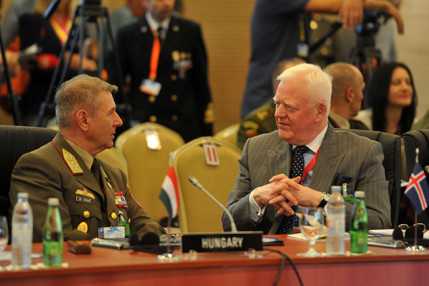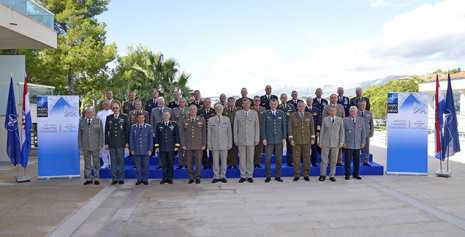Croatia Hosts NATO Military Commitee Chiefs of Defence Session
Szöveg: General Staff | 2016. szeptember 25. 8:42The Military Committee, NATO’s highest military authority met in Chiefs of Defence Session between 16–18 September. The chiefs of defence meet in this format annually to discuss NATO’s most significant strategic military issues, and to exchange views on the relevant topics.

The session started with opening remarks by the President of the Republic of Croatia, who welcomed the chiefs of defence and the other participants of the conference. She emphasized that the decisions approved by heads of states and governments at the Warsaw Summit lay down the basic guidelines for further work.
The professional work started with opening remarks by Gen. Petr Pavel, Chairman of NATO Military Committee. In his remarks, he underlined that the military adaptation to the changed security situation is continuing in the interest of countering threats emerging on NATO’s eastern and southern borders. It is important to harmonize the measures taken so far with the tasks planned for further reinforcement of the eastern and southern flanks. The chiefs of defence agreed that NATO must be able to respond to challenges from any direction, but several of them pointed to the destabilizing effects of the migrant crisis and terrorism in Europe. To be able to carry out all these tasks, NATO needs a robust and flexible command structure.
The chiefs of defence also agreed that in order to effectively tackle the challenges, the NATO command structure (NCS) must be more closely linked to the NATO force structure (NFS) and the multinational commands.
The afternoon sessions focused on reviewing NATO operations and the possibility of establishing a NATO mission or activity in Iraq. In their contributions, Gen. Dr. Tibor Benkő and most chiefs of defence emphasized the changed security situation, the significance of the Western Balkan region and the stability of the KFOR operation in it, as well as the conditions-based drawdown of KFOR operational strength. In view of the migration crisis that is posing an increasing challenge in the Mediterranean, they underlined the significance of NATO’s continuing commitment and the strengthening of cooperation between NATO and the EU. In what followed, the chiefs of defence discussed the initial steps and concept of the NATO capacity building and training mission in Iraq.

At the end of the session, Gen. Dr. Tibor Benkő handed over the position of “Senior Chief of Defence" to his Estonian counterpart, after holding it for a year.
On the margins of the conference, the Hungarian, Croatian, Bulgarian and Slovenian chiefs of defence signed a Letter of Intent concerning “The Creation of a Multinational Special Aviation Training Solution". This multinational arrangement will provide the signatories with a complete training capability to generate and sustain their Special Operations Aviation units in an international cooperation.
Next time, the NATO Military Committee will meet in chiefs of defence session in Albania as the host country next September.